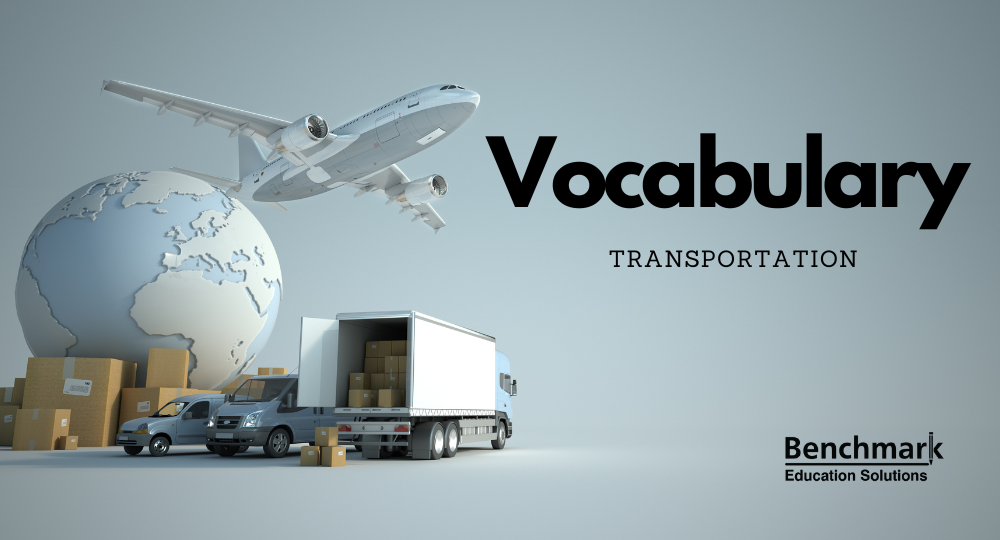
Questions on the topic of transportation are extremely common on the IELTS test because it is something that we all use every day of our lives. This page contains some of the most common words and phrases that will help you discuss different types of transport and infrastructure. There are some IELTS practice exercises for you to use the words with some real questions.
Table of Contents
1. Transportation and Vehicle Types Vocabulary
- Aeroplane – A flying vehicle with two wings
- Bicycle/Bike – A two-wheeled vehicle that is powered by the rider moving pedals
- Boat – A small water vessel powered by either an engine, sails, or oars
- Bus – A large vehicle that transports paying passengers along fixed routes
- Bus lane – A part of the road where only buses are allowed to drive
- Car – A four-wheeled vehicle powered by an engine
- Coach – (UK) A bus that travels between cities or on long journeys / (USA) – Economy class on a flight
- Congestion – An excess of vehicles that causes journey times to increase and a slower average speed
- Cycle lane – A part of the road that can only be used by cyclists
- Diversion – An alternative route for traffic when the normal route cannot be used
- Ferry – A sea vessel that carries paying passengers
- Fuel – A substance used to provide power. For example, coal, gas, petrol etc…
- Helicopter – A type of aircraft with spinning rotors to provide lift
- High-speed rail – A train system that uses trains travelling at extremely high speeds
- Junction – The place where two or more roads meet
- Lane – A section of the road marked with painted lines that are used to separate traffic
- Lorry/Truck – A large vehicle that transports goods
- Metro/Underground(UK) – An underground passenger rail system
- Motorbike/Motorcycle – A two-wheeled vehicle powered by an engine
- Motorway/Highway – A wide road for fast-moving traffic
- Overcrowded – Too many people for what is comfortable
- Pedestrian – A person walking on a road or in a built-up area
- Petrol/Gas – A fuel obtained from petroleum used to power vehicles
- Punctual – Happening at the correct time
- Rail – By train
- Road/Street – A route leading from one place to another
- Roundabout/Traffic circle – A circular junction where several roads meet
- Scooter – A light two-wheeled motor vehicle, similar to a motorbike, but smaller
- Ship – A sea vessel that is larger than a boat and used for moving people and goods by sea
- Taxi/Cab – A car in which passengers pay the driver to take them to their destination
- Timetable/Schedule – A chart that shows the arrival and departure times of buses/flights/trains
- Traffic jam – A line of traffic caused by congestion/accidents/roadworks etc…
- Traffic lights – The system that controls traffic at junctions
- Train – A long vehicle that runs on tracks and carries passengers or goods
- Tram – An electric vehicle similar to a bus but that runs on tracks
- Vehicle – A thing used for transporting goods or people
- Yacht – A medium-sized sailboat used for cruising and recreation
2. General Transportation and Vehicle Types Vocabulary Activity
| Read Full Answer |
How is the public transport system in the place where you live? The public transport where I live is a nightmare because all of the buses are extremely overcrowded because there are not enough of them for the number of people. We also have a metro system that consists of just two lines that cross from north to south and east to west. Because there are only two lines, it is not very useful for me as neither goes near my house or place of work. The other problem the system is that there are no cycle lanes at all so they get caught up in all the congestion caused by the huge number of cars. Do you think there should be separate lanes for bikes? Yes I do think that there should be more cycle lanes because increased cycle use reduces congestion and pollution, as well as improving the health of citizens. When there are no special lanes for cyclists, it is more dangerous because they are forced to ride alongside fast moving vehicles. Busy roundabouts and junctions can be difficult to navigate because there are often four or five lanes and people do not always respect the traffic lights. |
3. Transportation Idioms, Phrasal Verbs, and Collocations
Using idioms and phrasal verbs correctly and accurately will make your answers sound more accurate and professional. This section contains some of the most commonly used idioms and phrasal verbs to discuss transportation. There is also an exercise for you to practice using the words with real IELTS questions.
- At a crossroads – At a junction/At a stage of life where you need to make a decision
- Backseat driver – A car passenger that gives advice and comments that are not welcome
- Beat the traffic – To leave somewhere early to avoid traffic / To avoid traffic by any means
- Bumper to bumper – Heavy traffic
- Dead on time – Something that happens at the exact time it is supposed to
- Energy-efficient – Something that uses low amounts of energy
- Environmentally friendly – Things that do not harm the environment
- Get in to – To enter a place or a mode of transport. For example, a car/a taxi
- Get off – To exit certain forms of transport. For example, a train/a plane/a bus/a bike/a ferry
- Get on to – To enter certain forms of transport. For example, a train/a plane/a bus/a bike/a ferry
- Get out of – To exit a place or a form of transport. For example, a car/a taxi
- Get to – To arrive or travel to a place
- Hit the road – To depart on a journey
- Hitch a lift – To get a ride in a passing vehicle / To be driven somewhere by someone else
- Hop on my bike – To get on a bike
- In the driver’s seat – In control
- In the nick of time – Just in time
- Noise pollution – Harmful or annoying levels of sound
- Road rage – When a person becomes angry or aggressive towards other road users
- Self-driving vehicles – Vehicles that use AI instead of a human operator
- Set off – To depart on a journey
- Zone out – To lose concentration / To daydream or not mentally focus on anything in particular
4. Transportation Idioms, Phrasal Verbs, and Collocations Activity
| Read Full Answer |
Is a bicycle a good form of transport? Yes I believe that bikes are a good form of transport because of the ease at which I can just hop on my bike and get to places quickly and cheaply. I love to go out to the countryside on my bike and just zone out to some music and ride alongside the canal. They are also much more environmentally-friendly than cars because they don’t use a combustible fuel such as petrol. Furthermore, they create no noise pollution because there is no loud engine. They are also good for beating the traffic because you can go on the pavement and not get caught in rush hour traffic jams. How has transport changed in your country in recent decades? The transport system has changed a lot here in recent decades. The major difference is that now the cars are bumper to bumper because there are so many of them. I think the road users seem angrier in general and I often see incidences of road rage on my daily commute. Also, in the 1970s we used to have a rail system that carried passengers. The government let it fall into disrepair and now it only carries goods and freight. Another thing that I used to do in the 80s, was stand on the entrance ramp to the motorway and hitch a ride to the beach with my friends. In the current age, I think this is too dangerous, especially for women. Another new advancement that we have is also self-driving vehicles, which are still in the early stages of development, but within 10 years I think they will make up the majority of vehicles on the road |
For more practice, Visit IELTS vocabulary for Tourism.


